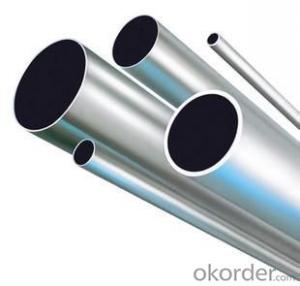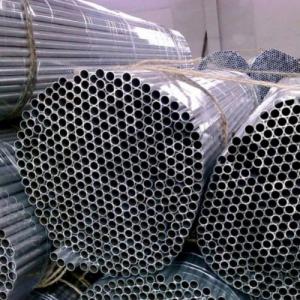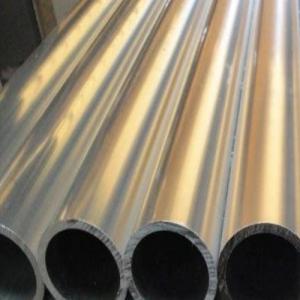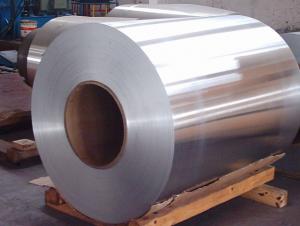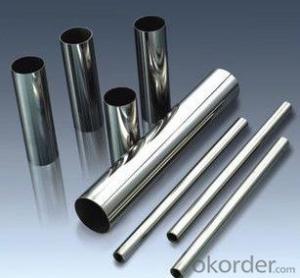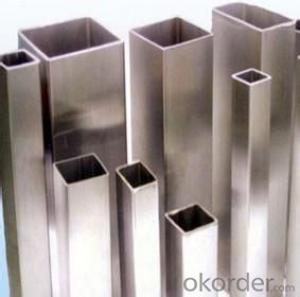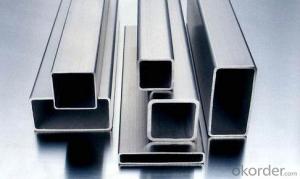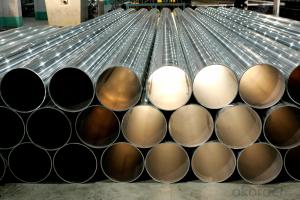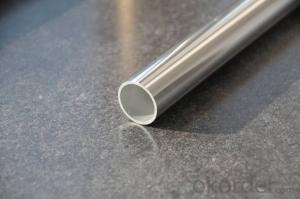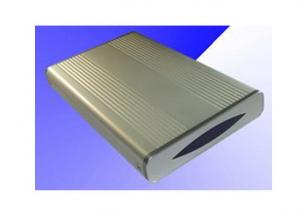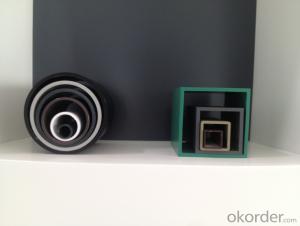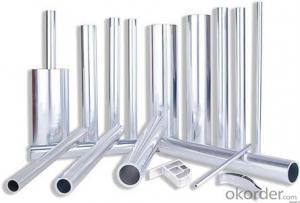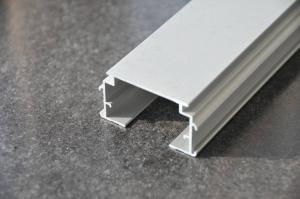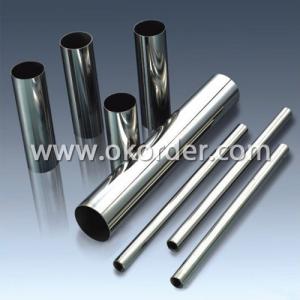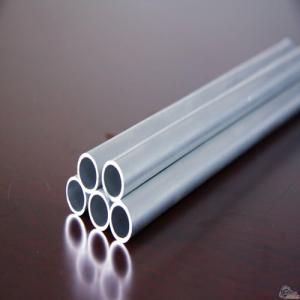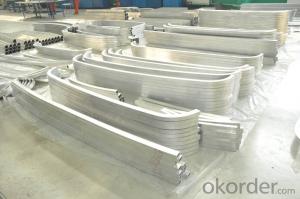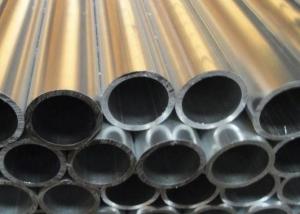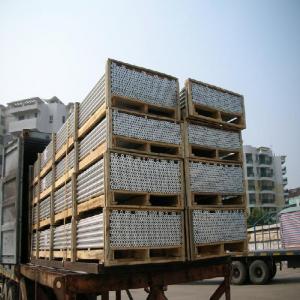Aluminum extruded tubes
OKorder Service Pledge
OKorder Financial Service
You Might Also Like
We are the largest aluminum profilemanufacture in
Provide full size of seamed tubes(Round):
Diameter(Out):7.54mm-573mm
Wall thickness:1mm-44mm
Material | Alloy Aluminum 6063,6061,6005,6082 or customer nominated |
Temper | T3, T4, T5, T6 and other |
Surface | Anodize, electrophoresis, powder coating, PVDF coating, wood grain painting, etc. |
Colour | Any colour based on Standard Germany RAL Mark |
Length | Not more than 16 meters |
Good Package | Inner plastic film /outside carton/wooden pallets |
Payment Method | T/T, L/C, etc |
Delivery Time | Normally 2-4 weeks, Delivery time can be consulted. |
Press Machine | 500-12500 tons all together 93 press lines. |
Fabrication | 1. Furniture 2. Drilling; 3. Bending; 4. Cutting; 5. etc. |
Certificate | ISO/TS 16949,DNV,IRIS,CCS,AFA,etc. |
Dies | 1. Using our dies, no fee; |
2. Using customer drawing, opening dies, usually about 5~50 tons then the dies cost can be refunded. | |
3. Die cost is negotiable base on the order quantity | |
Capability | Annual output 800,000 tons |
- Q: Can aluminum pipes be used for heat exchangers?
- Yes, aluminum pipes can be used for heat exchangers. Aluminum is a commonly used material in the construction of heat exchangers due to its excellent thermal conductivity and corrosion resistance properties. Aluminum pipes are lightweight, durable, and can effectively transfer heat between two fluids or gases. The high thermal conductivity of aluminum allows for efficient heat transfer, making it an ideal choice for heat exchanger applications. Additionally, aluminum pipes are often preferred in industries where weight reduction is crucial, such as aerospace and automotive, due to their lightweight nature.
- Q: Are aluminum pipes suitable for underground drainage systems?
- Aluminum pipes are indeed a suitable choice for underground drainage systems. Due to its lightweight and durable nature, aluminum is highly resistant to corrosion, making it an excellent option for underground applications that might encounter moisture and other elements. Moreover, aluminum pipes boast a lengthy lifespan and necessitate minimal upkeep, rendering them a cost-effective selection for drainage systems. Nonetheless, it is crucial to contemplate the precise demands of the drainage system and seek advice from professionals to ascertain if aluminum pipes are the optimal choice for the particular project.
- Q: Can aluminum pipes be used for structural supports in buildings?
- Yes, aluminum pipes can be used for structural supports in buildings. Aluminum is a lightweight and corrosion-resistant material, making it an ideal choice for structural applications. It has a high strength-to-weight ratio, allowing it to withstand heavy loads while remaining relatively light. Additionally, aluminum pipes can be easily shaped and welded, making them versatile for various structural designs. However, it is important to consider the specific requirements and regulations of each building project before using aluminum pipes as structural supports.
- Q: The length of the aluminum tube is about 180mm, the diameter is 19mm, and the wall thickness is about 1mm. It should be bent into the radian of R300. No deformation
- The mandrel with a diameter smaller than the inner diameter of the aluminum pipe is made into two sections, and the aluminum pipe is inserted from both ends (contact at both ends), and the mandrel can be pulled out when bent into the required radian. A mandrel can be made of material that is softer than aluminum, such as lead.
- Q: Can aluminum pipes be bent or shaped easily?
- Yes, aluminum pipes can be bent or shaped easily. Aluminum is known for its malleability, which means it can be easily shaped or formed without cracking or breaking. This characteristic makes aluminum pipes a popular choice in various applications where flexibility is required. Aluminum pipes can be bent using a variety of methods such as cold bending, rotary draw bending, or heat induction bending. Additionally, they can also be shaped through processes like extrusion or rolling. The ease with which aluminum pipes can be bent or shaped makes them a versatile option in industries such as construction, automotive, and aerospace.
- Q: Do aluminum pipes require any special tools for installation?
- Installation of aluminum pipes may require the use of specialized tools. These tools encompass pipe cutters, deburring tools, reaming tools, and crimping tools. To achieve the desired length, pipe cutters are essential for accurately cutting the aluminum pipe. Smooth connections are ensured by deburring tools, which eliminate any rough edges or burrs on the cut ends of the pipe. Reaming tools serve the purpose of enlarging the inside diameter of the pipe, facilitating the insertion of fittings or connectors. Crimping tools, on the other hand, are commonly employed to establish secure and leak-proof connections between aluminum pipes and fittings. To guarantee a reliable plumbing system, it is imperative to utilize the appropriate tools for aluminum pipe installation.
- Q: Can aluminum pipes be used for airport terminals?
- Airport terminals can indeed utilize aluminum pipes. Aluminum is a popular material choice for a wide range of applications in airport terminals, thanks to its numerous benefits. To begin with, aluminum is lightweight, making it easier to handle during construction and installation. This can result in cost savings and quicker project completion times. Furthermore, aluminum pipes are resistant to corrosion, which is particularly important in environments like airport terminals that commonly experience moisture, humidity, and chemical exposure. This resistance to corrosion ensures the durability and longevity of the pipes, reducing the need for maintenance and replacement in the long term. Another advantage of aluminum pipes in airport terminals is their exceptional thermal conductivity. Aluminum pipes can efficiently transfer heat, making them suitable for applications such as HVAC systems. This property contributes to energy efficiency and cost savings in the terminal's operations. Additionally, aluminum is a sustainable material that can be easily recycled. This aligns with the growing emphasis on environmental responsibility in modern construction practices. By utilizing aluminum pipes, airport terminals can contribute to sustainable building practices and decrease their carbon footprint. To sum up, aluminum pipes can be effectively employed in airport terminals due to their lightweight nature, resistance to corrosion, thermal conductivity, and sustainability. Given these advantages, aluminum is a suitable material choice for various applications within airport terminal infrastructure.
- Q: aluminum tubes or iron pipes?Just bought oushennasi 62L small refrigerator (only a small box, frozen) to test what tube, took the magnet to the test, dry filter is iron, copper capillary, will also test where,Another: if it is iron, what does it matter?
- Now you should know how to use the refrigerator properly and the after-sale service
- Q: Is GREE a brass tube or an aluminum tube?
- Air conditioning heat exchange tube is the use of pure copper is not soft aluminum tubes could not resist exposure and alternating hot and cold days and months multiplying each business even in order to reduce the cost is not used because of the short service life of aluminum tubes and easy deformation of the head down business costs high maintenance rate is lost in their own businesses after all is said and done. Copper is only copper content more with less
- Q: Are aluminum pipes suitable for nuclear power plants?
- Yes, aluminum pipes are not suitable for use in nuclear power plants. While aluminum is a lightweight and corrosion-resistant material, it has certain limitations that make it unsuitable for applications in nuclear power plants. One of the main concerns with using aluminum pipes in nuclear power plants is its relatively low melting point. Aluminum has a melting point of about 660 degrees Celsius, which is significantly lower than the operating temperatures experienced in nuclear power plants. The high temperatures in nuclear power plants can exceed the melting point of aluminum, leading to deformation or failure of the pipes, which can compromise the integrity of the system. Another significant concern is aluminum's low neutron absorption cross-section. Neutrons are an important component in nuclear reactions, and materials used in nuclear power plants need to have the ability to absorb these neutrons to control the reaction and prevent a runaway chain reaction. Aluminum has a relatively low neutron absorption rate, which makes it unsuitable for use in critical areas where neutron absorption is required. Additionally, aluminum is susceptible to corrosion in certain conditions, particularly in the presence of water or moisture. Nuclear power plants use water as a coolant and for various other purposes, and the corrosive environment can lead to the degradation of aluminum pipes over time. Corrosion can compromise the structural integrity of the pipes, leading to leaks or failures, which can have severe consequences in a nuclear power plant. Considering these factors, materials that are commonly used in nuclear power plants, such as stainless steel or other high-performance alloys, are preferred over aluminum due to their higher melting points, better neutron absorption properties, and superior resistance to corrosion. In conclusion, aluminum pipes are not suitable for use in nuclear power plants due to their low melting point, poor neutron absorption properties, and susceptibility to corrosion. Other materials, such as stainless steel, are preferred for their higher temperature resistance, better neutron absorption rates, and superior corrosion resistance, ensuring the safety and reliability of nuclear power plant operations.
Send your message to us
Aluminum extruded tubes
OKorder Service Pledge
OKorder Financial Service
Similar products
Hot products
Hot Searches
Related keywords
